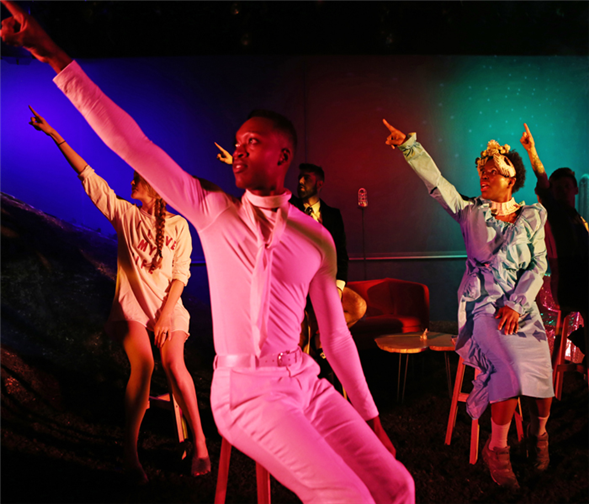Translate Page

A new play riffs on Thornton Wilder's classic
---
We all live in multiple worlds at once. Our families, our friends, our co-workers, our neighbors, our fellow passengers on the subway car – every group we belong to or pass through places its own frame around our experience of the day. Then there's the world inside our head, where no one but us can even see what's going on, let alone understand it.
At the same time, there's only one world. All these realities, all these perspectives, are ultimately happening in a single place, on one planet, which is big enough for everything. And how you feel about your specific life being part of the general world may be a clue to how you'll feel about Casey Llewellyn's new play. (It's running now at HERE, in a production from The Foundry Theatre.)
It's called O, Earth, which tells you something about its ambition. More to the point, it's a queer-eyed riff on Our Town, filling Thornton Wilder's classic with people and cultures that were largely invisible when the original premiered in 1938. Emily still falls for George, for instance, but now George is transgender. The Stage Manager, originally written as an older white man, still comments on other characters, but now she's a woman of color who occasionally talks about herself. In one scene she even stops the play for a lively debate with the ghosts of trans activists Sylvia Rivera and Marsha P. Johnson. They all know how it feels to be "in the play and not be in the story," and they're ready to command our attention.
They aren't the only ones making themselves heard. Eventually, George and Emily leave their little town, and in their travels, the meet everyone from Ellen DeGeneres to Thornton Wilder himself. Each character has a different way of being, and the more they interact, the harder it can be for them to co-exist.
That tension underlines how O, Earth, for all its changes to the original, still contains Our Town's quest to make sense of it all – to clearly see what it means to be human in the world.
{Image1}
And just like Our Town, which calls for ladders and platforms instead of realistic looking sets, O, Earth gets at these big ideas by creating unusual spaces. "We realized a literal set couldn't hold this play," says director Dustin Wills. "We need to be able to read so many different ideas onto the [stage]."
To that end, the set is mostly a large, empty room, with a massive mound of dirt piled stage right. That's where Thornton Wilder is trying to dig up a time capsule and where he eventually uncovers something wholly unexpected. Meanwhile, other worlds get carried in and out, so that the set for Ellen's talk show sits inches away from George and Emily's ladders. And then there's the actual theatre we're in. Some characters – especially the ghosts – can see us in our seats, so they talk to us.
It's crucial for these arenas to exist simultaneously. For Llewellyn, this clarifies how easy it is for people to affect each other – and especially hurt each other.
"One of the questions I was trying to address is, 'How are we together in the face of violence?'" she says. "You don't even have to be violent yourself to be part of perpetuating violence. In all the different realities of the different members of queer community or trans community, we all have a very different relationship to violence."
This theme is especially clear at the end of the play, when several elements collide in a surprising way. "That moment was hard," Llewellyn says. "Because it's, 'Okay, we've harmed each other with what has gone down. And the world includes harm in general. So how are we together? How do we stay together?'"
She continues, "I was thinking, 'Let's not make that violence invisible or deny that it's happening, but also, let's not rest in a place of isolation or hate.'"
Without giving too much away, the resolution involves a striking musical cue and a clarion call from some of the historical figures. They lead the way to something bigger than hurt. As Wills explains, "We thought that we have to celebrate the pioneers that came before us. And not just celebrate them but carry them with us out of the theatre and into the world."
---
TDF Members: At press time, discount tickets were available for O, Earth. Click here to browse all our ticket offers.
Follow Mark Blankenship at @IAmBlankenship. Follow TDF at @TDFNYC.
Photo by Julieta Cervantes. Top photo: The cast of 'O, Earth'